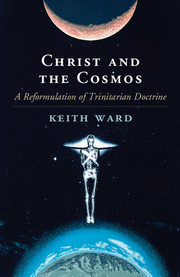Book contents
- Frontmatter
- Contents
- Preface
- Acknowledgements
- PART I THE THREEFOLD NATURE OF THE DIVINE BEING
- PART II THE BIBLICAL SOURCES OF TRINITARIAN THOUGHT
- PART III THE TRINITY, IMMANENT AND ECONOMIC
- PART IV THE SOCIAL TRINITY
- PART V THE COSMIC TRINITY
- 36 The Doctrine of Perichoresis
- 37 The Convergence of Social and One-Consciousness Models of the Trinity
- 38 Life-Streams and Persons
- 39 Modalism and Necessity
- 40 The Cosmic Trinity
- Bibliography
- Subject Index
- Name Index
40 - The Cosmic Trinity
from PART V - THE COSMIC TRINITY
Published online by Cambridge University Press: 05 September 2015
- Frontmatter
- Contents
- Preface
- Acknowledgements
- PART I THE THREEFOLD NATURE OF THE DIVINE BEING
- PART II THE BIBLICAL SOURCES OF TRINITARIAN THOUGHT
- PART III THE TRINITY, IMMANENT AND ECONOMIC
- PART IV THE SOCIAL TRINITY
- PART V THE COSMIC TRINITY
- 36 The Doctrine of Perichoresis
- 37 The Convergence of Social and One-Consciousness Models of the Trinity
- 38 Life-Streams and Persons
- 39 Modalism and Necessity
- 40 The Cosmic Trinity
- Bibliography
- Subject Index
- Name Index
Summary
There have been three main themes running throughout this discussion of God as Trinity. One is that the idea of the Trinity as a society of three subjects of consciousness, although it can seem emotionally appealing, is logically and theologically inadequate and that in any case in its most rigorously worked-out versions it converges with the more traditional one-consciousness view. A second is that the God who was incarnate in Jesus is revealed as a dynamic, creative, responsive, and relational God whose revealed nature as ‘love’ points to a divine movement to create and love other persons. The ‘social Trinity’ hypothesis is right about this, though it is not really satisfactory to try to place that ‘other’ within the being of God. The third theme is that God, as creator of the cosmos, cannot be fully and finally understood in the rather anthropocentric images familiar to human beings on this planet. What God has revealed to us of the divine being, while it is absolutely true in relation to us and our understanding, is far from enabling us to comprehend the glory and majesty of the divine being in itself. God, we may say with the Anglican theologian John Macquarrie, is the name of that Mystery which sets a goal of supreme value to the cosmos, mediates signs of that goal and value to those who are open to perceive them, and evokes a commitment to hope that the goal can ultimately be realised.
I think it is clear that Macquarrie's suggestions are derived from his belief that an authentic sign of the moral goal of human existence was present and manifest in Jesus and that Jesus’ suffering love and resurrection prefigures, for Christians, that goal and the way to it. This can be put by saying that God can be correctly described as existing in threefold form.
God, writes Macquarrie, is the primordial source of all possibilities of being. God is ‘poured out through expressive Being, giving rise to the world of particular beings’. And God finally unites all created beings to the divine. That is God as Trinity, three ‘movements within the dynamic yet stable mystery that we call “Being”’ (Macquarrie, 1966, p. 198). Movements are forms of divine action, but they are not just successive ways of acting.
- Type
- Chapter
- Information
- Christ and the CosmosA Reformulation of Trinitarian Doctrine, pp. 257 - 262Publisher: Cambridge University PressPrint publication year: 2015



